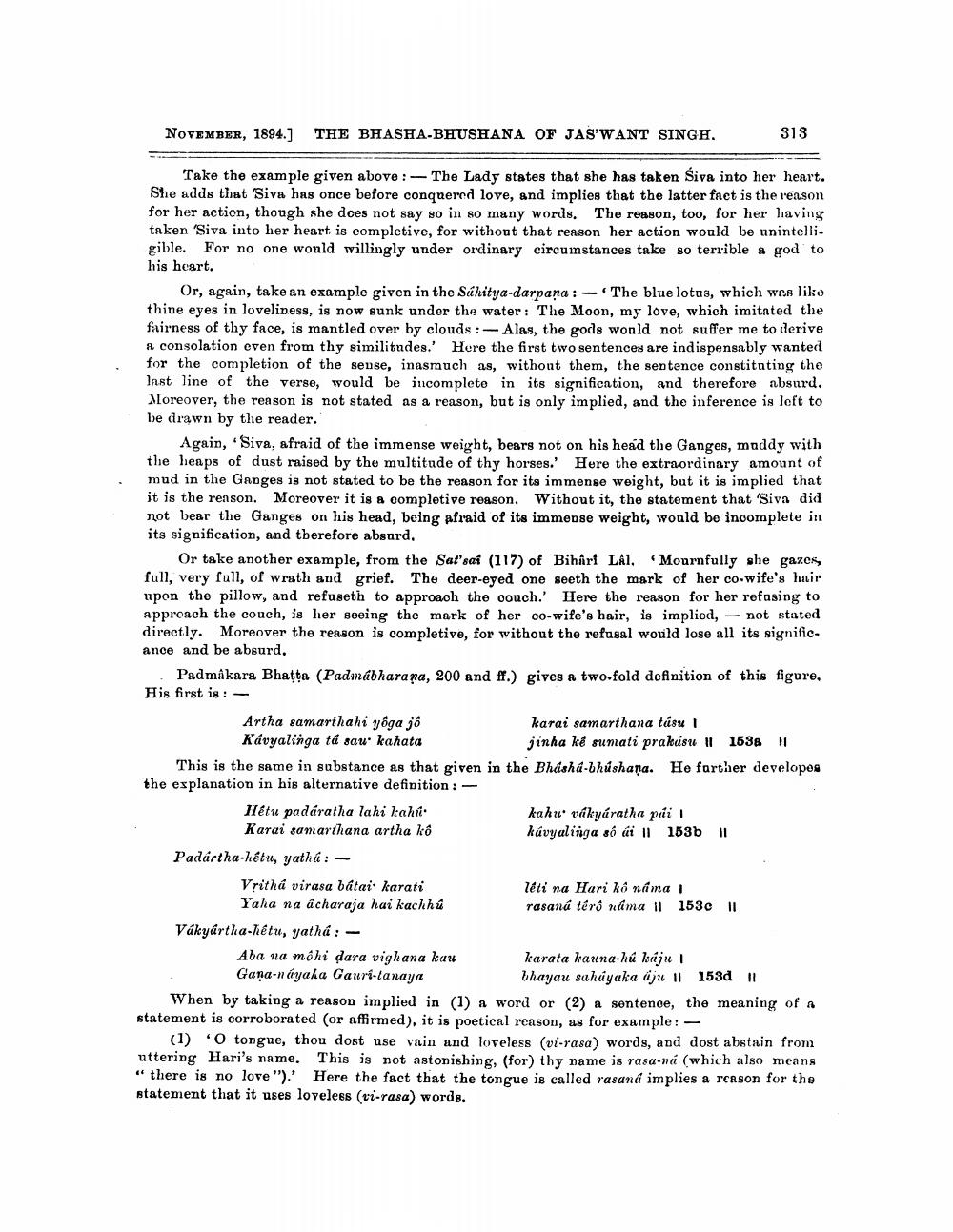________________
NOVEMBER, 1894.] THE BHASHA-BHUSHANA OF JAS'WANT SINGH.
Take the example given above:- The Lady states that she has taken Śiva into her heart. She adds that Siva has once before conquered love, and implies that the latter fact is the reason for her action, though she does not say so in so many words. The reason, too, for her having taken 'Siva into her heart is completive, for without that reason her action would be unintelligible. For no one would willingly under ordinary circumstances take so terrible a god to his heart.
Or, again, take an example given in the Sahitya-darpana: The blue lotus, which was like thine eyes in loveliness, is now sunk under the water: The Moon, my love, which imitated the fairness of thy face, is mantled over by clouds:- Alas, the gods would not suffer me to derive a consolation even from thy similitudes.' Here the first two sentences are indispensably wanted for the completion of the sense, inasmuch as, without them, the sentence constituting the last line of the verse, would be incomplete in its signification, and therefore absurd. Moreover, the reason is not stated as a reason, but is only implied, and the inference is left to be drawn by the reader.
Again, 'Siva, afraid of the immense weight, bears not on his head the Ganges, muddy with the heaps of dust raised by the multitude of thy horses.' Here the extraordinary amount of mud in the Ganges is not stated to be the reason for its immense weight, but it is implied that it is the reason. Moreover it is a completive reason. Without it, the statement that 'Siva did not bear the Ganges on his head, being afraid of its immense weight, would be incomplete in its signification, and therefore absurd.
Or take another example, from the Sat'sai (117) of Bihari Lal, Mournfully she gazes, full, very full, of wrath and grief. The deer-eyed one seeth the mark of her co-wife's hair upon the pillow, and refuseth to approach the couch.' Here the reason for her refusing to approach the couch, is her seeing the mark of her co-wife's hair, is implied, not stated directly. Moreover the reason is completive, for without the refusal would lose all its significance and be absurd.
Padmakara Bhaṭṭa (Padmabharana, 200 and ff.) gives a two-fold definition of this figure, His first is
Artha samarthahi yoga jo Kávyalinga tá sau kahata
Hétu padáratha lahi kahú Karai samarthana artha kô
This is the same in substance as that given in the Bhasha-bhúshana. He farther developes the explanation in his alternative definition: -
Padártha-hétu, yatha: -
Vritha virasa bátai karati Yaha na acharaja hai kachhu
313
Vákyartha-hétu, yatha:
Aba na mohi dara vigkana kau Gana-nayaka Gauri-tanaya
karai samarthana túsu |
jinha ke sumati prakásu 1538 ||
kahu vakyáratha pái kávyalinga sé ái || 153b ||
léti na Hari ko náma rasaná térô náma || 153 ||
karata kauna-hú káju bhayau sahayaka aju
153d ||
When by taking a reason implied in (1) a word or (2) a sentence, the meaning of a statement is corroborated (or affirmed), it is poetical reason, as for example: -
(1) O tongue, thou dost use vain and loveless (vi-rasa) words, and dost abstain from uttering Hari's name. This is not astonishing, (for) thy name is rasa-ná (which also means "there is no love"). Here the fact that the tongue is called rasaná implies a reason for the statement that it uses loveless (vi-rasa) words.




